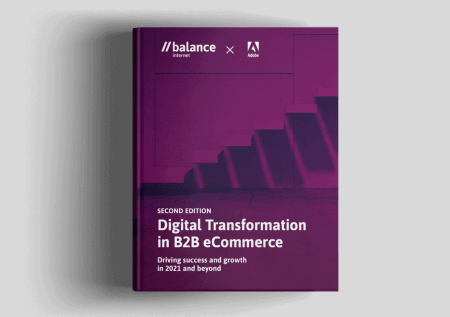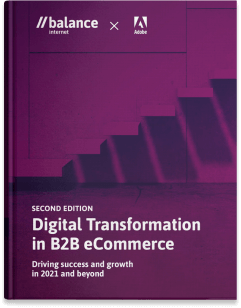Just launched: Second edition of Digital Transformation in B2B eCommerce
Latest news / 2 March 2021


We are delighted to announce the highly anticipated release of the second edition of ‘Digital Transformation in B2B eCommerce — Driving Success and Growth in 2021 and Beyond.’ This comprehensive whitepaper is a definitive guide for navigating the complex digital transformation landscape in the APAC B2B industry.
Over the past year, our team at Balance have closely observed and collaborated with market leaders who have demonstrated exceptional resilience and adaptability in response to the unprecedented disruptions caused by the global COVID-19 pandemic. Their unwavering drive to succeed in digital transformation has catalysed this second edition, as we aim to provide industry professionals with valuable insights and strategies to overcome challenges and seize opportunities.
This whitepaper represents a culmination of our collective expertise, alongside the contributions of over 40 exceptional industry experts and their esteemed organisations. Their insights have laid the groundwork for in-depth exploration, examination of emerging trends, and establishment of industry gold standards and benchmarks.
With an unwavering commitment to excellence, Balance has delivered innovative, scalable, and high-performing eCommerce solutions to leading Australian B2B organisations. This second edition reflects the critical aspects of digital transformation in B2B eCommerce derived from our successful collaborations with these industry leaders.
We invite you to download a complimentary copy of this whitepaper, as it serves as a blueprint for success in the ever-evolving landscape of B2B eCommerce. Let the insights within each chapter inspire your organisation to challenge conventional norms, push the boundaries of what is possible, and embrace a transformative commerce vision for 2021 and beyond.
Thank you to our team of experts!
We sincerely appreciate the esteemed industry experts whose contributions have enriched this whitepaper. Their invaluable insights ensure that it remains a valuable resource for organisations seeking to embark on a successful digital transformation journey.
Embrace the opportunity to turn the lessons learned from 2020 into a robust plan for growth. Now, more than ever is the time for innovation and growth. Download your complimentary copy of the whitepaper today and chart your course towards digital transformation excellence.
Read on to discover some of the most notable highlights from the second edition, and remember to download a copy today.
Driving Successful Digital Transformation in B2B eCommerce
In today’s rapidly evolving eCommerce landscape, digital transformation has emerged as a business-critical imperative for B2B brands. As highlighted by Magento, the digital experience you provide not only sets you apart from competitors but also ensures long-term viability in the market.
However, embarking on a digital transformation journey is merely the first step; success lies in mastering this transformative process. According to McKinsey, B2B companies that can navigate digital transformation successfully achieve higher shareholder returns and significant revenue growth than their industry peers. Mastering digital transformation requires comprehensive knowledge, extensive experience, and skilled teams.
While the opportunities presented by digital transformation are substantial, businesses face various challenges. One significant hurdle is moving from conceptualisation and strategic planning to effective implementation. Sadly, many organisations struggle to deliver solutions efficiently, with many B2B companies taking over a year to progress from concept to implementation. Embracing agile test-and-learn methodologies and rapid prototyping processes, proven to drive innovation and customer satisfaction, remains an underutilised practice.
Digital transformation entails adopting new technologies to replace non-digital or legacy systems, resulting in optimised, automated, and innovative business operations. It goes beyond mere process enhancement; it requires a comprehensive re-imagination of the entire business model. Successful digital transformation benefits customers and empowers the organisation’s very fabric—the people teams.
To navigate the intricate landscape of digital transformation, setting distinctive goals and establishing an agile pathway towards the future is essential. Embracing new ways of operating and fostering a culture of continuous learning is fundamental to success. At Balance, we specialise in delivering transformative solutions that transform B2B eCommerce. Guided by our core values, we emphasise reshaping business models, redefining products or services, realigning work processes, integrating IT with business objectives, and fostering collaboration among various organisational units.
In summary, digital transformation in B2B eCommerce is an ongoing journey that demands a profound understanding of customer expectations, an unwavering commitment to mastering emerging technologies, and a collaborative, agile approach. By embracing digital transformation and aligning it with strategic goals and core values, businesses can not only thrive but also lead the way in the ever-changing eCommerce landscape.
Expert Insight – Sebastian Klett
As the Solutions Architecture Practice Lead at Balance, Sebastian guides Australian businesses, corporations, and educational institutions through their digital transformation journeys.
“2020 was a turbulent year that required many businesses to adjust and change their approach to serve and connect with their customers. Companies came up with new ways to transform their business and ways of working to survive in these uncertain times.
The pandemic has demonstrated a distinct divide between businesses digitally mature enough to face unpredictable circumstances and those that are not. In many countries around the globe, lockdowns and uncertainty continue, and only the companies that seek to anticipate and adjust to new trends will stand a chance of surviving the new landscape.
While some companies pioneered adjusting their business processes during the pandemic, many others failed or still need help to adapt. The term digital transformation is a topic that is now more present than ever before.
The last 6-12 months have had a significant impact on the speed and necessity of digital transformation for businesses, and many companies were forced to adapt to digital technology. Not only businesses that are selling directly to consumers in urgent need of adjusting their way of operating but so too are companies and brands that are outside the B2B industry.
At Balance, we’ve seen that companies across various industries are using the pandemic to probe their digital landscape to ensure that similar situations do not repeat themselves and to ensure that their business is set up for success in the future.
Companies that entered the path of a digital transformation before the pandemic are now ahead of their competitors and are receiving the benefits of ensuring that their business is ready for change at any given moment. In 2021 we will be seeing more businesses rolling out their digital transformation strategy and planning for a future which can change very rapidly, as we have seen in the past year.”
The Crucial Role of Skilled People and Resources in B2B Digital Transformation
Digital transformation goes beyond implementing new technologies; it requires skilled employees and executives to drive its success. While businesses can make changes to their trading processes or introduce eCommerce solutions, empowering their employees is equally essential for a successful digital transformation.
The global COVID-19 pandemic has further emphasised the need for skilled individuals and new ways of working in the B2B industry. Adapting to this new normal has presented challenges, prompting businesses to identify strengths and weaknesses within their teams.
Finding the right individuals for specific roles is a significant factor impacting growth, meeting market demands, and delivering digital transformation solutions.
As we reimagine our approach to building a “dream team,” cross-functional and agile organisational structures play a pivotal role. Research shows that aligning sales and marketing teams, for example, can lead to up to 400% higher annual revenue growth.
Successful digital transformation requires a blend of in-house, outsourced, and third-party teams, each contributing their expertise to accelerate development.
Businesses must consider the organisational structure, recruitment, and resource allocation to effectively integrate new technologies. To drive the people aspect of digital transformation, organisations should prioritise strategy, culture, and leadership, fostering an environment that embraces innovation and transformation at all levels.
Expert Insight – Zac Gray
Zac Gray is the Manager of Marketing – Digital & eCommerce at Motion Asia Pacific. Zac is passionate about the importance of company culture, the digital maturity of the workforce, and the alignment of strategy, culture, and leadership in achieving digital transformation goals.
“Through my extensive experience over the last decade in the eCommerce sector, one of the most critical things I’ve come to understand and respect is the role of skilled and dedicated people in any business. Over the course of my career, when implementing any digital solution to integrate modern technologies into critical areas of a business, the role of individuals and teams has always been just as crucial as the technologies themselves.
While technology is the critical enabler for digital transformation, people are truly the crucial enablers of a digital workforce. When individuals can see ‘rather than simply imagine’ a future for themselves and their careers, it often forges a pathway to creating a lasting and robust company culture. Therefore, the digital maturity of a business is unsurprisingly tied to the digital maturity of its workforce, amongst other factors.”
Customer Experience (CX) and the Path to Success in Digital Transformation
In today’s business landscape, customer experience (CX) has emerged as a key driver of success in digital transformation. Econsultancy and Adobe’s Digital Trends Survey revealed that CX ranked highest among B2B companies’ most exciting opportunities in 2020, surpassing content marketing, video marketing, and social media. The post-pandemic world further solidified the importance of CX, with businesses focusing on customer-centricity, employee value, and digital experiences as catalysts for growth and strategy.
When embarking on B2B eCommerce digital transformation, CX should be a central focus of solution architecture and strategic development. Delivering an exceptional CX requires efforts beyond platform development, encompassing restructuring customer service, support channels, shipping, fulfilment, and data consolidation. Each chapter of this whitepaper delves into a specific area of focus to help organisations excel in CX.
However, challenges arise in generating actionable insights from customer data. While data plays a crucial role, it is vital to validate insights and prevent misinterpretation by relying on alternate data sources. Many organisations grapple with multiple data sources and technologies, making streamlining and integration a critical challenge in delivering a winning customer experience.
To drive success in CX, six critical areas of focus have been identified: commitment, fulfilment, seamlessness, responsiveness, proactivity, and evolution. Successful B2B eCommerce businesses that master digital transformation incorporate these areas into their company vision and strategic objectives. Commitment involves valuing customers and aligning the entire business with the company vision, while fulfilment ensures meeting customer needs throughout the relationship. Seamlessness, responsiveness, proactivity, and evolution all contribute to continuously improving the customer experience.
Placing the customer at the centre of your business universe is paramount. Leveraging customer data, streamlining data sources, and focusing on the six critical areas of CX will pave the way for success in digital transformation.
Expert Insight- Sonia Shwabsky
Sonia Shwabsky is the Chief Growth Officer at Snap Franchising Limited. With her passion for forward-thinking initiatives and extensive experience in managing complex data sets, Sonia offers valuable insights into the challenges and benefits of integrating customer data into modern eCommerce platforms. Her role at Snap Print & Design, Australia’s leading franchise, has provided her with firsthand experience in navigating the complexities of customer data consolidation and its crucial role in enabling effective customer relationships. Let’s delve into Sonia’s expert perspective on the importance of customer data integration in eCommerce.
“You are looking at a modern customer-focused eCommerce system, but you have legacy or undisciplined systems housing your customer data. Snap has over 130 independently managed and owned centres, so making sure the customer data was in order was challenging but a necessary step when integrating with a modern eCommerce platform.
Having experienced several business system changeovers, transitions and integrations, I would highly recommend beginning with your customer data. Knowing your customer’s needs and desires is paramount if you are to transact online and use technology to enable your relationships effectively.
Most Management Information Systems (MIS) are built to fulfil orders, manufacture products, and manage inventory or production, and customer data is an afterthought. When embarking on the eCommerce journey, you carry these legacy systems along with you. It is critical to get a Single Customer View of your customer data, so if, like Snap, you have multiple database sources, working through this integration piece is a painful yet worthwhile process to go through.
At Snap Print & Design, we had two separate systems per centre housing customer data, giving us the challenge of over 260 independent customer databases. Before we could embark on any meaningful customer relationship interactions, we started by amalgamating all of the customer data into one unified database. With a Single Customer View (SCV), this now enables us to communicate with our customers, with a greater understanding of their needs and where they are in their journey with Snap as one brand.”
The Role of Content in B2B Digital Transformation
Content plays a crucial role in driving B2B digital transformation by enabling businesses to connect with their customers, educate and inform decision-makers, and facilitate seamless interactions throughout the digital journey. In the context of digital transformation, content goes beyond marketing and becomes an essential component across various touchpoints and stages of the customer experience.
One of the key aspects of content in B2B digital transformation is its ability to deliver relevant and valuable information to customers. Whether it’s product specifications, technical documentation, user guides, or industry insights, content equips customers with the knowledge they need to make informed decisions. By providing comprehensive and easily accessible content, businesses can streamline the customer journey, reduce friction, and enhance the overall user experience.
Additionally, content serves as a powerful tool for nurturing relationships and building trust with customers. Thought leadership articles, case studies, and whitepapers demonstrate expertise and industry knowledge, positioning the business as a trusted advisor. When businesses deliver high-quality content that addresses the pain points and challenges of their target audience, they establish credibility and strengthen customer relationships.
Moreover, content plays a vital role in internal processes and collaboration during digital transformation. Well-structured and organised content repositories enable teams to access the right information at the right time, fostering collaboration and knowledge sharing. This ensures a unified understanding of customer needs and a coordinated approach to delivering exceptional digital experiences.
In the realm of B2B digital transformation, content also serves as a catalyst for innovation and agility. By leveraging customer feedback, data analytics, and market insights, businesses can continuously optimise their content strategies, tailoring them to evolving customer demands and industry trends. This iterative approach to content development drives innovation, enabling businesses to stay ahead of the competition and adapt to changing market conditions.
Ultimately, content is a critical enabler of B2B digital transformation, facilitating customer engagement, knowledge dissemination, and internal collaboration. By harnessing the power of content, businesses can create seamless and personalised digital experiences, nurture customer relationships, and drive innovation in an ever-evolving digital landscape.



